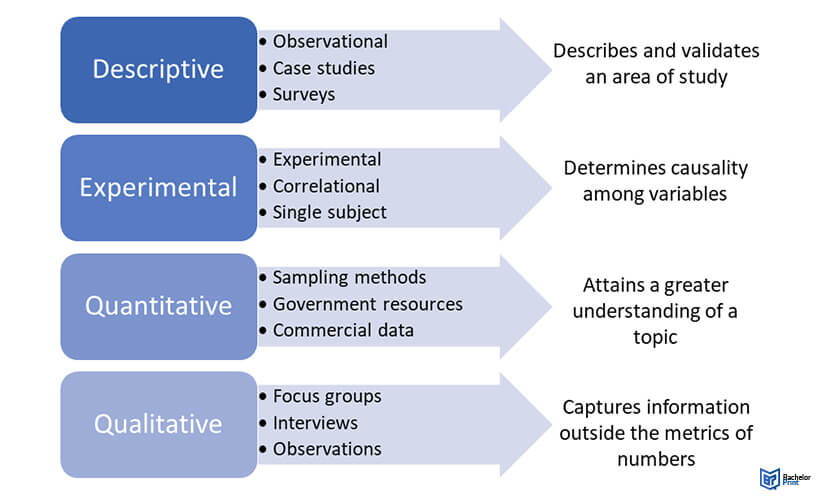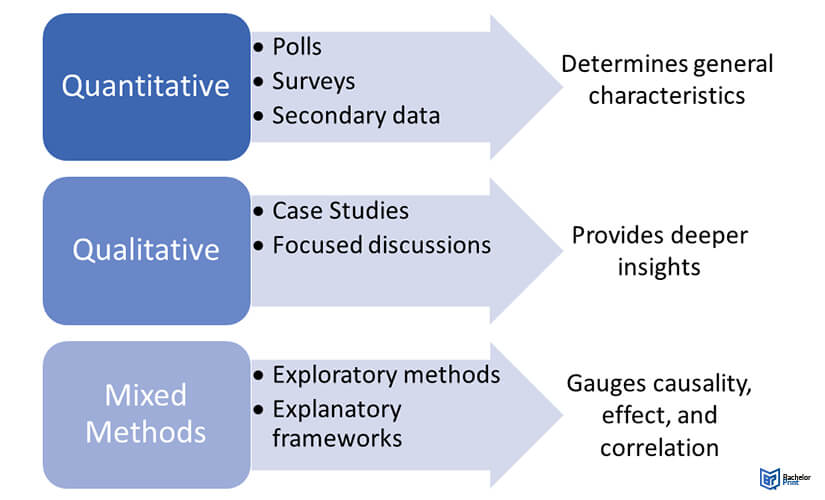
The methodology section of a research paper lets your readers analyse your approach to the study. It states the topic of your study and the tools used to conduct the research.
The methodology guides the researcher in effectively gathering, analysing, and interpreting data, ultimately ensuring the credibility and reliability of the study’s results.
Definition: Methodology
Methodology in research refers to the scientific framework adopted in the research process. Data for research in methodology is collected through surveys, interviews, group discussions, and tracking online trends.
1. Inductive vs. Deductive research
- Inductive reasoning in methodology is a blank-page approach, where researchers create hypotheses from observed patterns.
- Deductive reasoning in methodology is concerned with creating hypotheses around existing theories.
- A mixed approach combines inductive and deductive research in different parts of the study where either is best suited.
Examples of each approach
| Type of Research | Example |
| Inductive |
Observation – Your Uber ride took longer than the underground railway. Pattern – Your Uber ride has taken longer than the underground railway for 2 weeks Theory – Uber rides take longer than the underground railway |
| Deductive |
Theory – Uber rides take longer than the underground railway Hypothesis – If you took the underground railway, you would get there faster than an Uber Collect data on time taken by both means in one route |
| Mixed | Begin with the observation and work with the theory in mind |
2. Setting and participants in methodology
Setting in research methodology can be a physical, social, or cultural context where a study is based. Participants are the target population involved directly in a research study.
3. Data collection in methodology
Data collection is a systematic process of gathering, classifying, and labelling essential variables in a study. Researchers use data to formulate valid hypotheses in research methodology.
in Your Thesis
Qualitative vs. Quantitative data collection
Qualitative data collection includes interviews, group discussions, and observations. It involves close-ended questionnaires, polls, and surveys to collect numerical data.
Below are the strengths and weaknesses of each method:
| Method | Strengths | Weaknesses |
| Qualitative data collection | • Provides an extensive array of insights • It can be used to study new phenomena • It helps study low-level correlations |
• It may take a long time to gather information. • It may not be possible to replicate results in several studies |
|
Quantitative data collection |
• Data can be consistent and reliable • Repetitive inputs can be automated • It is possible to analyse large volumes of data |
• It often requires a specialized set of skills and a workforce • Some essential variables may not be quantifiable |
Primary vs. Secondary data collection
Primary data collection is the process of collecting raw data through surveys, experiments, and interviews. Field surveys are considered a reliable source of primary data. They allow researchers to control sample size and quality.
Secondary data refers to primary data used by researchers in a new study. Sources of secondary data include websites, books, newspapers, and journals.
| Data | Strengths | Weaknesses |
| Primary Data | • Specific data is collected • The quality of data can be controlled • Valuable data can be collected |
• It is time-consuming • It has many costs • Some data collected may not be usable |
| Secondary Data | • Data collection is easy and systematic • It is usually readily available • There are many sources |
• It may be insufficient in some cases • The data may be outdated • It may be difficult to find precise data |
Descriptive vs. Experimental data collection
Descriptive data collection highlights what the subject matter is rather than why it exists. For example, a descriptive study would focus on what many millennials do in their free time rather than why they do it.
Experimental data collection is a more hands-on method of research. It involves altering certain variables to see how they affect others. For example, changes in prices often change demand for the same product.
| Data collection | Strengths | Weaknesses |
| Descriptive data collection | • Offers a diverse range of usable data • It provides an adequate source of information • It is easy to perform |
• It may not provide or show causality • The data may not be replicable • Lack of statistical tools may cause biasness |
| Experimental data collection | • The findings of the study can be replicated • It provides specific findings • It provides a basis for causality |
• It is time-intensive • It may not offer usable findings • Some variables may not be under the researcher’s control |
Overview of data collection methods
Research methods guide the process of data collection and analysis. The following are some standard research methods and their relevance:

4. Data analysis in methodology
Data analysis is the logical process of applying statistical techniques to describe, sort, and summarize data. It condenses raw data inputs into usable insights in research methodology.
Qualitative data analysis
This is reviewing and analysing text data to identify and explain themes and underlying correlations. It is applied to non-numerical case studies of social, economic, and political phenomena, among other areas.
Quantitative data analysis
Quantitative analysis is concerned with analysing numbers. Numerical data is collected, and mathematical models are used to derive relationships between the data sets.
Overview of data analysis methods
Data analysis can be distilled into various forms and applications:

5. Ethical considerations in methodology
This component of research methodology outlines and explains ethical concerns noted and observed during research. Ethical considerations in research show how matters of integrity and ethical behaviour were upheld during the course of study. It is important to ensure research does not infringe on the rights and freedoms of the population.
Overview of methodology articles
- Between-subjects design
- Case study
- Cluster sampling
- Conceptual framework
- Confounding variables
- Construct validity
- Control group
- Control variables
- Controlled experiment
- Correlation vs causation
- Correlational research
- Cross-sectional study
- Data cleansing
- Data collection
- Discourse analysis
- Double-blind study
- Ethical considerations
- Ethnography
- Experimental design
- Explanatory research
- Explanatory vs response variables
- Exploratory research
- Extraneous variables
- Face validity
- Focus group
- Independent vs dependent variables
- Inductive and deductive reasoning
- Internal vs external validity
- Likert scale
- Literature review
- Mediator vs moderator
- Mixed methods research
- Multistage sampling
- Naturalistic observation
- Observational study
- Peer review
- Population vs sample
- Qualitative vs quantitative research
- Quasi experimental design
- Questionnaire
- Random assignment
- Random vs systematic errors
- Reliability vs validity
- Sampling bias
- Semi-structured interview
- Simple random sampling
- Stratified sampling
- Structured interview
- Systematic sampling
- Textual analysis
- Thematic analysis
- Transcribing interviews
- Triangulation in research
- Types of interviews
- Types of research
- Types of variables in research
- Unstructured interview
- Within-subjects design
FAQs
Interviews. Besides interviews, other research methods are focused on discussions, surveys, and polls. They serve as data collection practices.
Secondary sources of information are pre-recorded data sources. They are used in quantitative and qualitative research. Examples of secondary sources are journals, newspapers, and videotapes.
Descriptive research identifies and lists all the observable features of a research topic. It is used by researchers in methodology to create the scope of a research topic.
Research methodology is an integral part of research papers. It articulately shows the method used to collect and analyse data. Researchers develop a methodology to make their research usable and verifiable.
